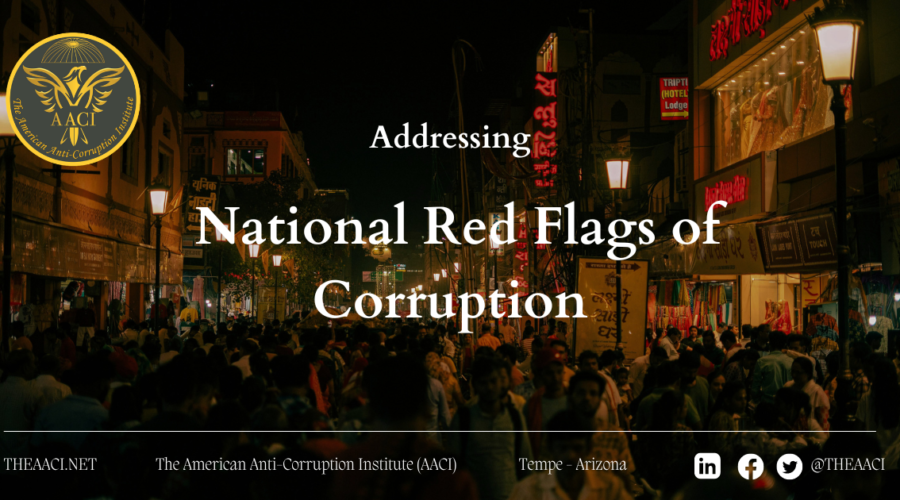Technical staff;
August 9, 2024
Introduction
Fraud and corruption are not only organizational issues but also national crises that can undermine a country’s development, governance, and citizen trust. Recognizing and addressing these red flags is critical for those charged with governance, citizens, and civil society to prevent the decay and corruption of a nation. This blog post identifies the ten most significant national red flags of fraud and corruption, describes their risks, and outlines what governments can do to address these issues effectively.
Ten National Red Flags of Fraud and Corruption
1. Lack of Transparency and Accountability
When governmental operations and decisions are opaque, it becomes easier for corrupt practices to thrive. Transparency ensures that actions are visible and decisions are subject to scrutiny, which helps in holding officials accountable.
2. Weak Legal Framework and Judicial System
A weak legal system fails to deter corruption. Ineffective laws, lax enforcement, and a compromised judiciary can lead to widespread corruption as individuals believe they can act with impunity.
3. Political Instability
Frequent changes in government, political unrest, or a lack of consistent policy direction can create an environment where corruption flourishes. Stability is essential for long-term anti-corruption strategies.
4. Concentration of Power
When power is concentrated in the hands of a few, it can lead to abuses of power and corruption. A system of checks and balances is crucial to prevent such concentration and ensure power is exercised responsibly.
5. Inadequate Public Sector Salaries
Underpaid public officials may resort to corrupt practices to supplement their income. Adequate compensation helps reduce the temptation for corruption and ensures a more honest workforce.
6. Poor Public Financial Management
Inefficient budgeting, lack of financial controls, and poor management of public funds can lead to embezzlement and misallocation of resources. Strong financial management practices are vital to prevent such occurrences.
7. Limited Access to Information
When citizens and civil society lack access to information, it becomes difficult to hold the government accountable. Freedom of information laws and practices empower citizens to demand transparency and accountability.
8. Weak Anti-Corruption Institutions
Institutions designed to fight corruption must be independent, well-resourced, and empowered. Weak institutions are ineffective and can be easily manipulated by corrupt individuals.
9. High Levels of Bureaucracy
Excessive bureaucracy can create opportunities for corruption, as individuals may need to bribe officials to expedite processes. Simplifying procedures reduces these opportunities and enhances efficiency.
10. Cultural Acceptance of Corruption
In societies where corruption is culturally accepted or seen as a norm, combating it becomes more challenging. Changing cultural attitudes through education and awareness is essential for long-term success.
The Damages of Unchecked Corruption
Unchecked corruption can devastate a nation, leading to economic decline, social inequality, and weakened governance. For example, in countries like Nigeria and Venezuela, extensive corruption has led to massive economic losses, poor public services, and widespread poverty. Corruption undermines public trust in institutions, discourages foreign investment, and stifles economic growth, perpetuating a cycle of underdevelopment.
Government Actions to Address Red Flags
1. Enhance Transparency and Accountability
Governments should implement transparent procedures and accountability mechanisms, including public access to governmental records and regular audits of public institutions.
2. Strengthen Legal Framework and Judicial Systems
Enacting robust anti-corruption laws, ensuring their enforcement, and maintaining an independent judiciary are critical steps. Special anti-corruption courts can expedite the prosecution of corruption cases.
3. Promote Political Stability
Stable governance structures and consistent policy frameworks are necessary to maintain an environment conducive to anti-corruption measures. This can be achieved through inclusive political processes and strong democratic institutions.
4. Decentralize Power
Implementing checks and balances, promoting decentralization, and encouraging citizen participation in governance can prevent the concentration of power and reduce opportunities for corruption.
5. Improve Public Sector Salaries
Providing competitive salaries and benefits to public officials can reduce the temptation for corrupt practices. This must be coupled with strict penalties for corruption.
6. Enhance Public Financial Management
Adopting best practices in budgeting, financial management, and audit procedures can prevent the mismanagement of public funds. Governments should also adopt e-procurement systems to reduce corruption in public procurement.
7. Ensure Access to Information
Governments should enact and enforce freedom of information laws, ensuring that citizens have access to government information. This transparency fosters accountability and empowers civil society.
8. Strengthen Anti-Corruption Institutions
Anti-corruption bodies must be independent, adequately funded, and equipped with the necessary legal powers to investigate and prosecute corruption effectively. International cooperation can also support these institutions.
9. Reduce Bureaucracy
Streamlining government processes and reducing red tape can minimize opportunities for corruption. Simplified procedures and digital governance solutions can enhance efficiency and transparency.
10. Change Cultural Attitudes
Governments, civil society, and educational institutions should work together to change cultural attitudes towards corruption. Public awareness campaigns, education, and the promotion of ethical behavior are essential for cultural change.
Conclusion
Identifying and addressing national red flags of fraud and corruption is crucial for the health and development of any nation. By recognizing these red flags and implementing comprehensive anti-corruption strategies, governments can prevent the decay caused by corruption and promote a more transparent, accountable, and prosperous society. Effective anti-corruption measures not only restore public trust but also pave the way for sustainable national development.
Photo by Shivam Maurya: https://www.pexels.com/photo/view-of-a-crowded-street-in-a-city-at-night-25048000/











































